Concrete Retaining Walls Construction in Bakersfield, California
Retaining walls construction services in Bakersfield, CA are offered with expert precision by True Base Concrete Company, a trusted name in concrete solutions. The company provides high-quality retaining wall installation that enhances property value, improves landscape stability, and ensures long-term durability. Homeowners in Kern County seeking reliable construction benefit from reinforced concrete, drainage solutions, and structural integrity designed to handle soil pressure effectively.
True Base Concrete Company in Bakersfield connects retaining wall construction with complementary services such as concrete foundations, stamped concrete, and patio construction to deliver complete outdoor solutions. The team uses advanced equipment, professional masonry techniques, and durable aggregates to guarantee strong results for both residential and commercial projects. Property owners in Bakersfield gain functional support for slope management while also achieving aesthetic landscaping benefits through custom wall designs.
What is Concrete Retaining Wall?
A concrete retaining wall is a rigid structure built from reinforced concrete to hold back soil, prevent erosion, and provide lateral support for changes in ground elevation. Concrete serves as the primary construction material because of its compressive strength, durability, and ability to resist hydrostatic pressure. Retaining walls function as essential landscape engineering solutions for properties with slopes, driveways, or foundations that need soil stabilization. Engineers often design them with reinforcement bars, drainage pipes, and footing systems to enhance stability and longevity.
Concrete retaining walls also provide aesthetic and functional value in residential, commercial, and civil engineering projects. The wall surface can be textured, stamped, or finished with stone veneer to complement architectural design while maintaining structural integrity. Landscape architects frequently incorporate geotechnical principles, load-bearing calculations, and proper backfill to ensure safety and performance. Property owners benefit from erosion control, increased usable yard space, and long-term value when concrete retaining walls are installed correctly.
What are the Types of Retaining Walls Services True Base Concrete Provide in Bakersfield, CA?
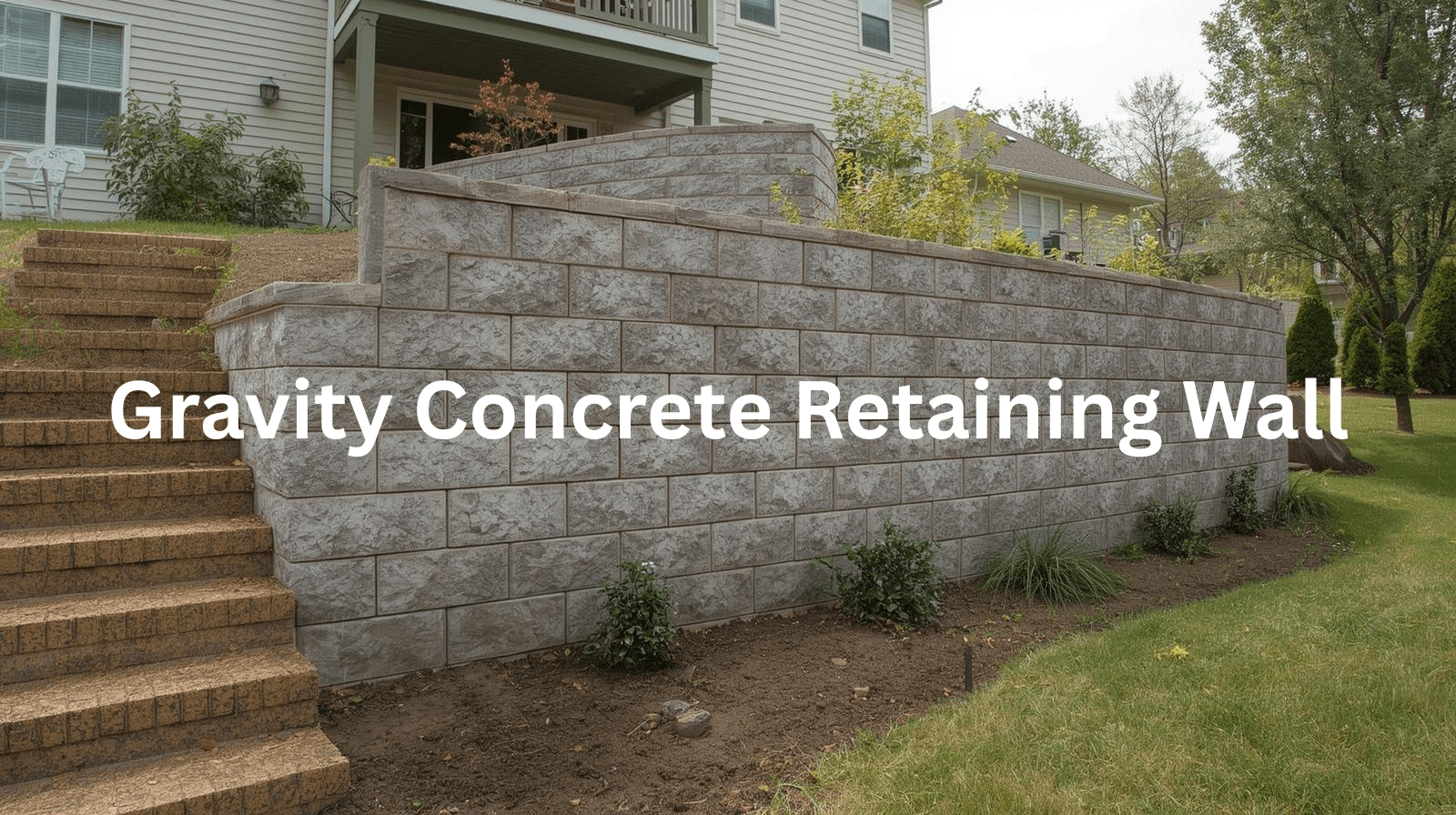
Gravity Concrete Retaining Wall
A gravity concrete retaining wall is defined as a structural wall system where the weight of the concrete mass resists lateral earth pressure and provides soil stabilization. The design relies on concrete density, wall thickness, and base foundation to counter sliding, overturning, and bearing failures. The structure supports landscaping, slope stabilization, and load-bearing requirements for residential developments, commercial complexes, and industrial properties. The wall’s implied function is to hold back soil effectively without reinforcement, depending on gravitational force for stability.
True Base Concrete Company manages gravity retaining wall projects through precision excavation, reinforced base preparation, and high-strength concrete pouring. The company applies engineering-grade drainage solutions to prevent hydrostatic pressure and enhance wall longevity. Residential sites benefit from aesthetic finishes combined with structural safety, while commercial projects emphasize load capacity for parking lots and urban infrastructure. Industrial projects receive heavy-duty concrete walls designed to meet safety codes, structural durability, and long-term soil retention needs.
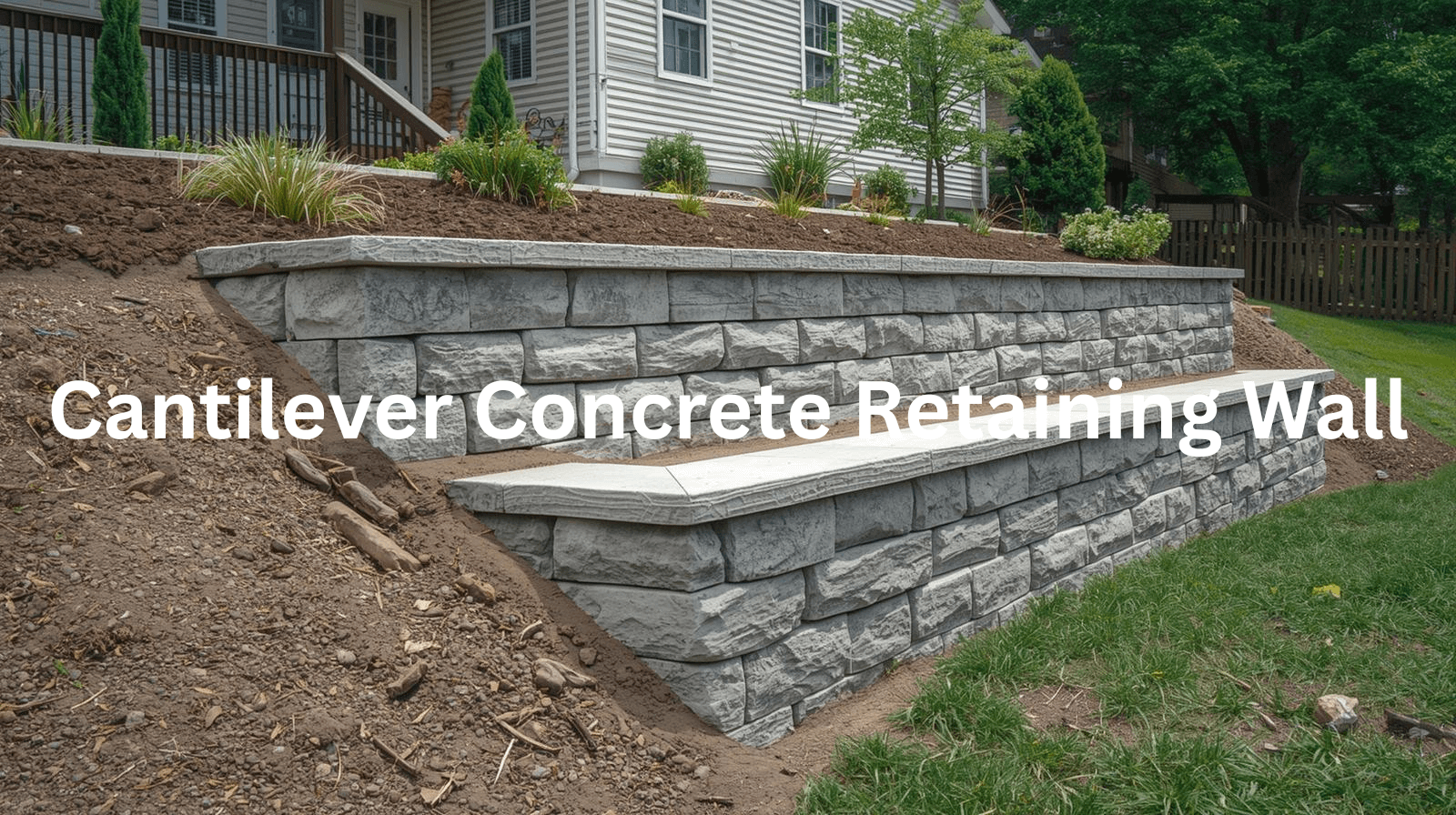
Cantilever Concrete Retaining Wall
A cantilever concrete retaining wall is defined as a reinforced concrete structure where the vertical stem and base slab act together to resist lateral earth pressure and stabilize soil masses. The wall uses the weight of the backfill and the self-weight of the concrete base slab to counter overturning and sliding forces. Engineers design cantilever retaining walls with footing extensions, shear keys, and proper drainage to ensure durability and structural safety. The application of this definition extends to both small-scale residential landscapes and large-scale commercial or industrial developments.
True Base Concrete Company manages cantilever concrete retaining wall projects by combining structural engineering expertise with site-specific construction practices. The company prepares the foundation by ensuring soil stability, reinforcement placement, and high-strength concrete mix for long-term performance. Their process integrates formwork precision, accurate stem alignment, and proper curing techniques to deliver safe and reliable retaining walls. Residential projects emphasize aesthetic finishes and space optimization, while commercial and industrial projects focus on load-bearing capacity, compliance with building codes, and heavy-duty durability.
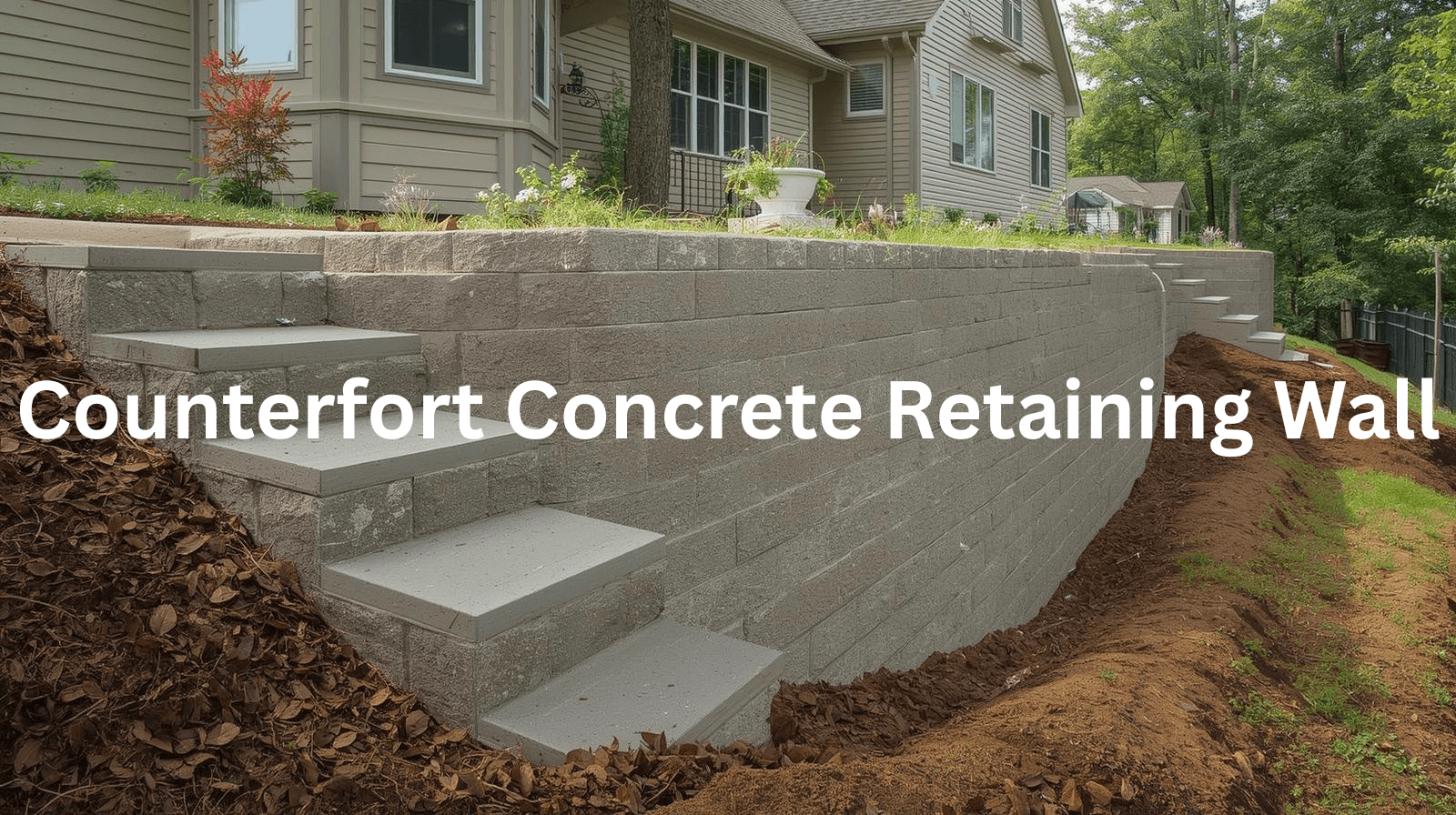
Counterfort Concrete Retaining Wall
A counterfort concrete retaining wall is defined as a reinforced concrete structure where vertical concrete webs, called counterforts, connect the stem of the wall to the base slab to resist lateral earth pressure efficiently. The counterforts act as compression struts that transfer soil load to the footing, which reduces bending moments and increases structural stability. The wall system is typically used for higher soil retaining requirements where gravity retaining walls or cantilever walls would be less economical. The function of the counterfort is to strengthen the stem and footing connection, allowing the wall to hold back soil in residential landscapes, commercial properties, and large-scale industrial sites.
True Base Concrete Company handles counterfort concrete retaining wall projects with precision engineering, durable material selection, and site-specific design strategies. The company evaluates soil conditions, slope stability, and load-bearing requirements before executing reinforced concrete placement for long-lasting performance. Their project team ensures residential properties receive aesthetic wall finishes, commercial sites benefit from functional load resistance, and industrial areas gain heavy-duty structural support. The construction process follows industry standards of concrete curing, reinforcement detailing, and drainage integration, ensuring walls remain durable against earth pressure, moisture, and environmental stresses.
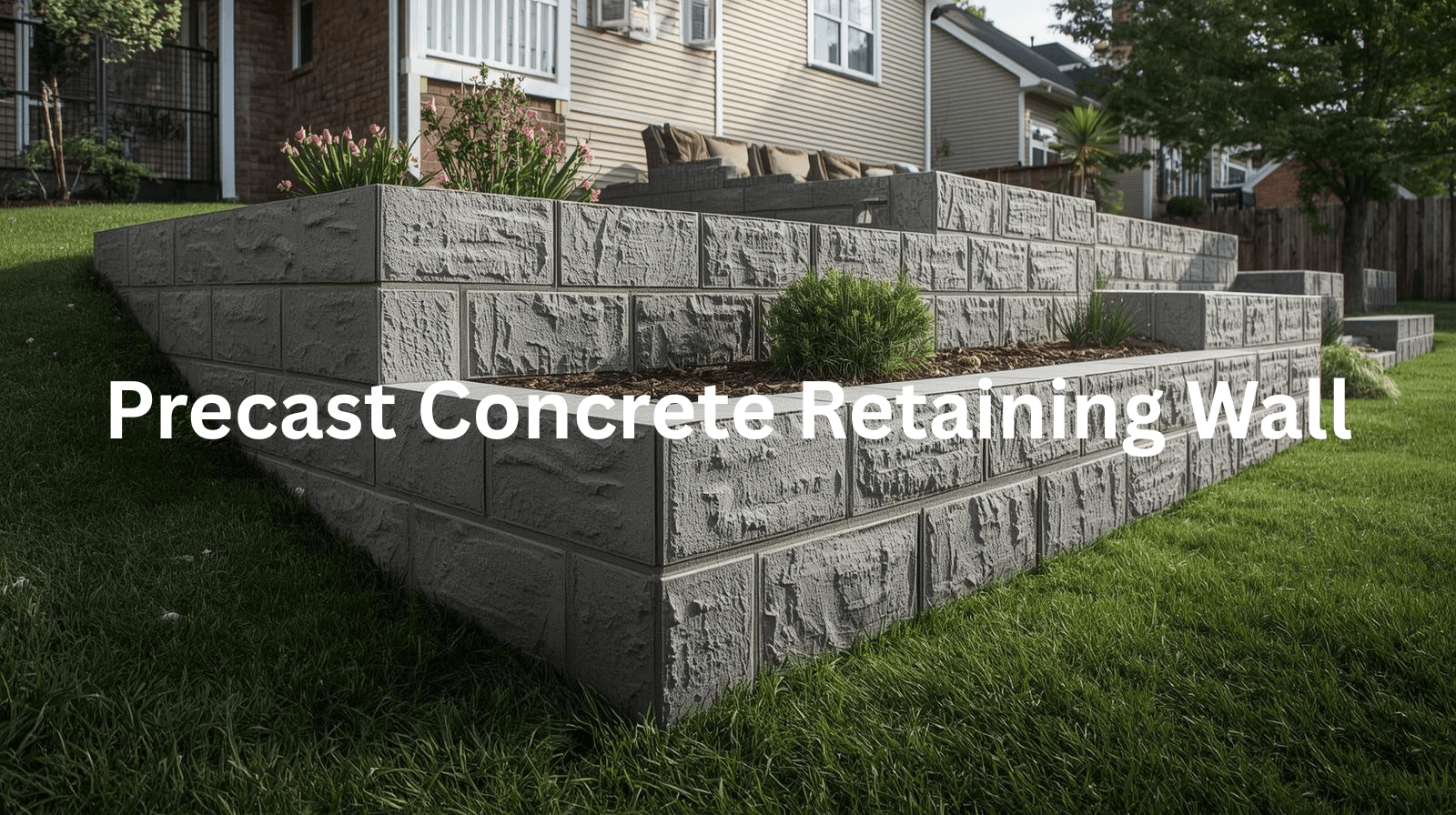
Precast Concrete Retaining Wall
A precast concrete retaining wall can be defined as a structural wall made from factory-cast reinforced concrete units designed to resist soil pressure and provide long-term stability for landscapes, building sites, and infrastructure projects. The retaining wall functions as a load-bearing structure where precast panels or blocks interlock with a foundation to manage earth retention in both sloped and level terrains. Precast concrete is manufactured under controlled conditions, ensuring consistent quality, durability, and compliance with engineering standards for residential, commercial, and industrial applications. The construction method reduces on-site labor and accelerates project timelines, making it a reliable solution for soil stabilization and property development.
True Base Concrete Company manages precast retaining wall projects by combining advanced concrete technology with site-specific engineering solutions to meet the needs of different property types. Residential areas often require aesthetically designed walls with integrated landscaping features, while commercial sites demand higher load-bearing capacity and safety compliance. Industrial projects typically involve large-scale retaining walls that support heavy equipment zones and warehouse perimeters. The company delivers these solutions through expert installation, high-strength base preparation, and adherence to zoning, drainage, and structural codes that guarantee both performance and longevity.
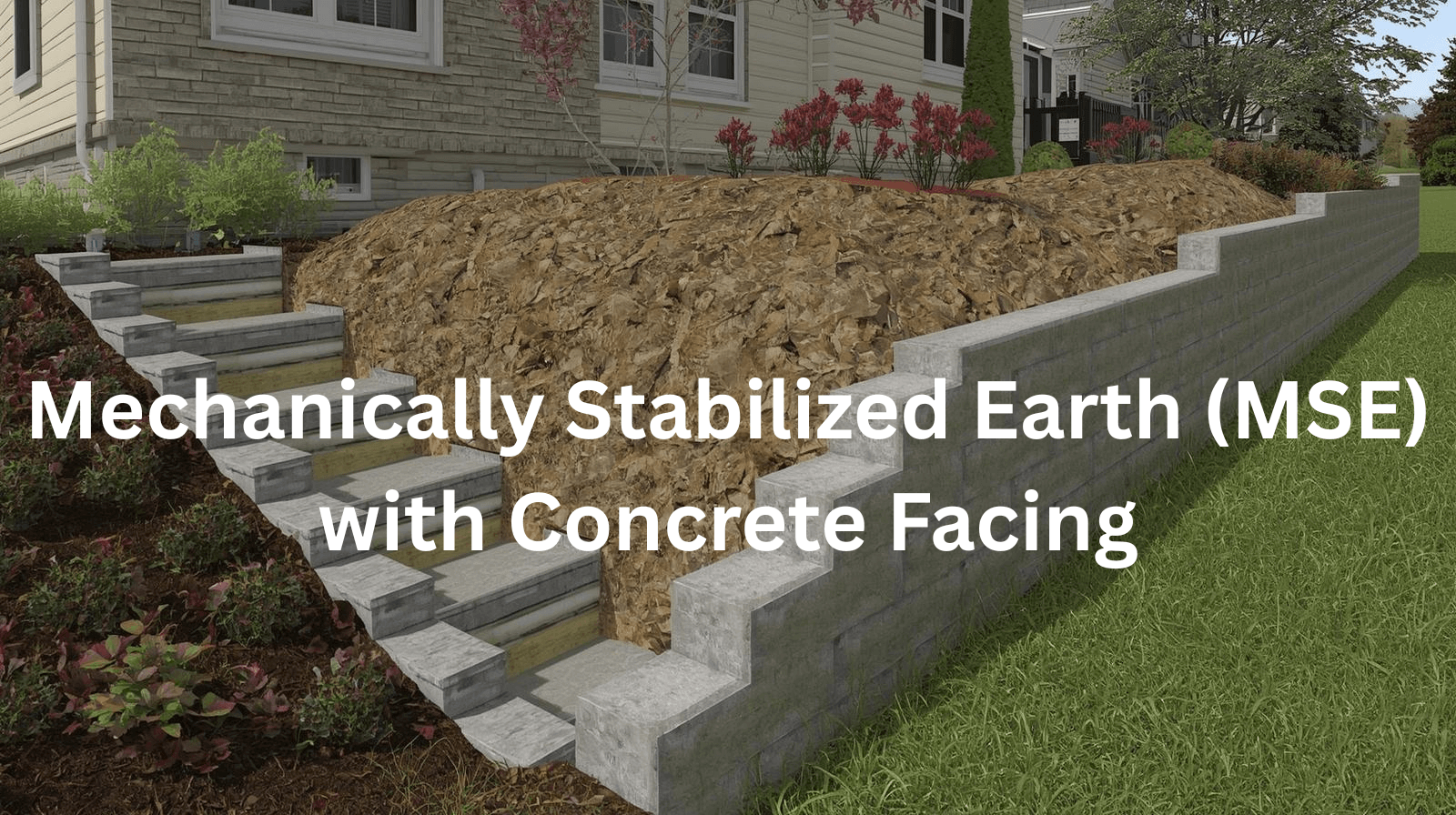
Mechanically Stabilized Earth (MSE) with Concrete Facing
Mechanically Stabilized Earth (MSE) with concrete facing is defined as a soil-retaining system where reinforced soil is combined with precast concrete panels to create structural stability for walls, slopes, and embankments. MSE structures provide high load-bearing capacity, resistance to lateral earth pressure, and long-term durability in residential, commercial, and industrial developments. Concrete facing panels serve as the visible structural element, while the internal soil reinforcement, often geogrid or steel strips, ensures overall mechanical stability of the system. The integration of reinforced backfill and concrete facing allows MSE walls to handle differential settlement and withstand seismic loads effectively.
True Base Concrete Company handles MSE with concrete facing projects by applying advanced site preparation, soil compaction, and precision panel alignment techniques that meet engineering specifications. The company focuses on residential projects with aesthetic finishes, commercial projects with high-performance structural requirements, and industrial projects demanding heavy-duty load support. Project execution involves material quality control, drainage integration, and compliance with local building codes to ensure longevity and safety. True Base Concrete leverages expertise in geotechnical engineering and concrete construction to deliver MSE solutions that combine structural strength with functional design across diverse project scales.
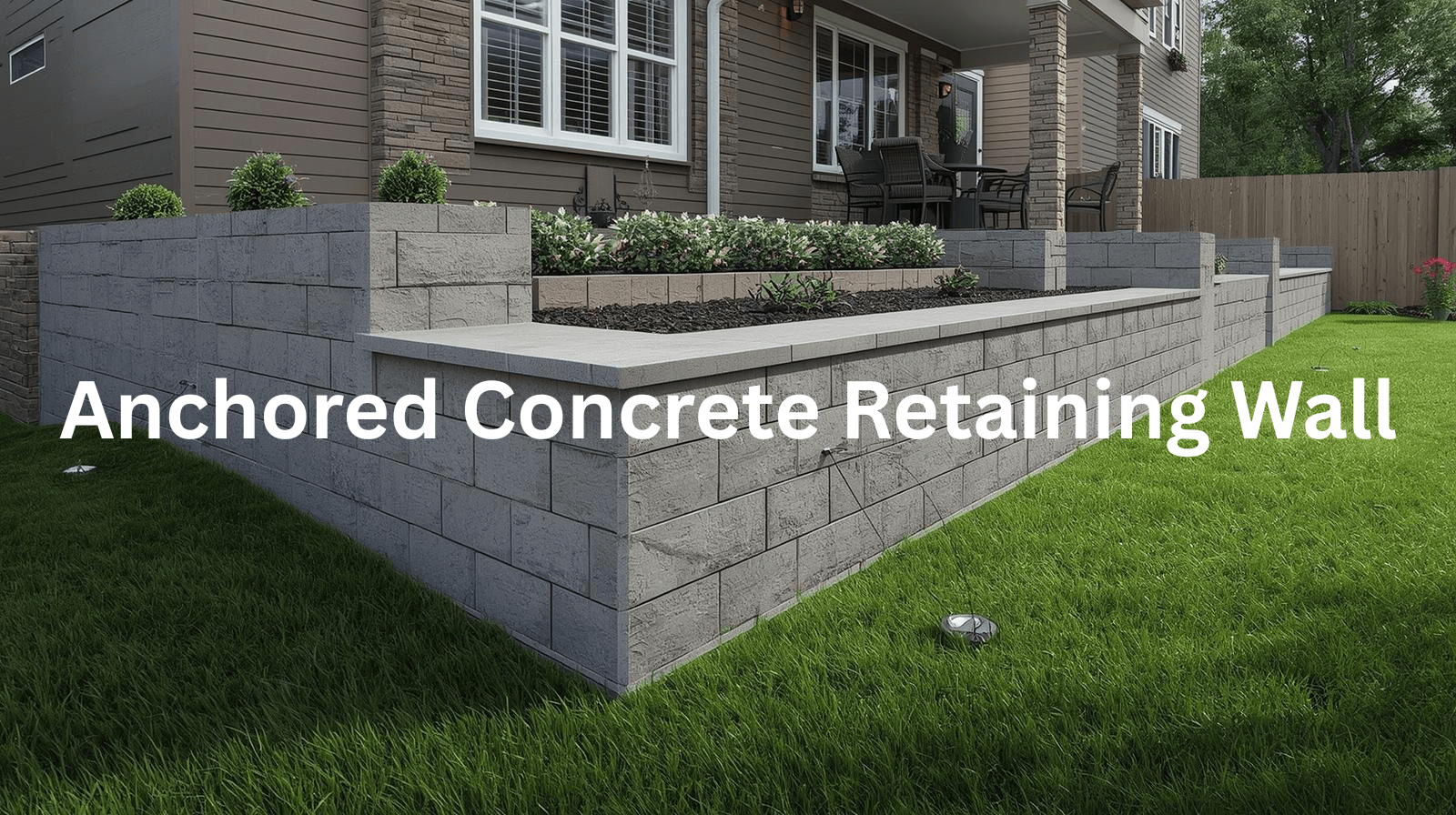
Anchored Concrete Retaining Wall
An anchored concrete retaining wall with concrete facing is defined as a reinforced retaining structure where concrete panels are supported by ground anchors and a solid concrete base to resist lateral earth pressures. The wall functions as the subject, the anchors act as the stabilizing elements, and the concrete facing provides both structural durability and an aesthetic surface finish. Engineers design the retaining wall to stabilize soil, prevent erosion, and support grade separation across residential landscapes, commercial properties, and industrial facilities. Contractors apply geotechnical analysis and structural engineering principles so the retaining wall safely transfers loads into the foundation.
True Base Concrete Company handles anchored concrete retaining wall projects by combining excavation expertise, precision anchor installation, and high-strength concrete placement. The company manages residential projects by ensuring backyard slopes and garden areas remain stable, and it executes commercial work by supporting parking lots and building perimeters. The contractor completes industrial-scale retaining wall construction with heavy-duty anchoring systems and concrete facings designed for long-term performance. True Base Concrete Company delivers projects with engineered reinforcement, efficient project management, and compliance with local building codes for lasting safety and strength.
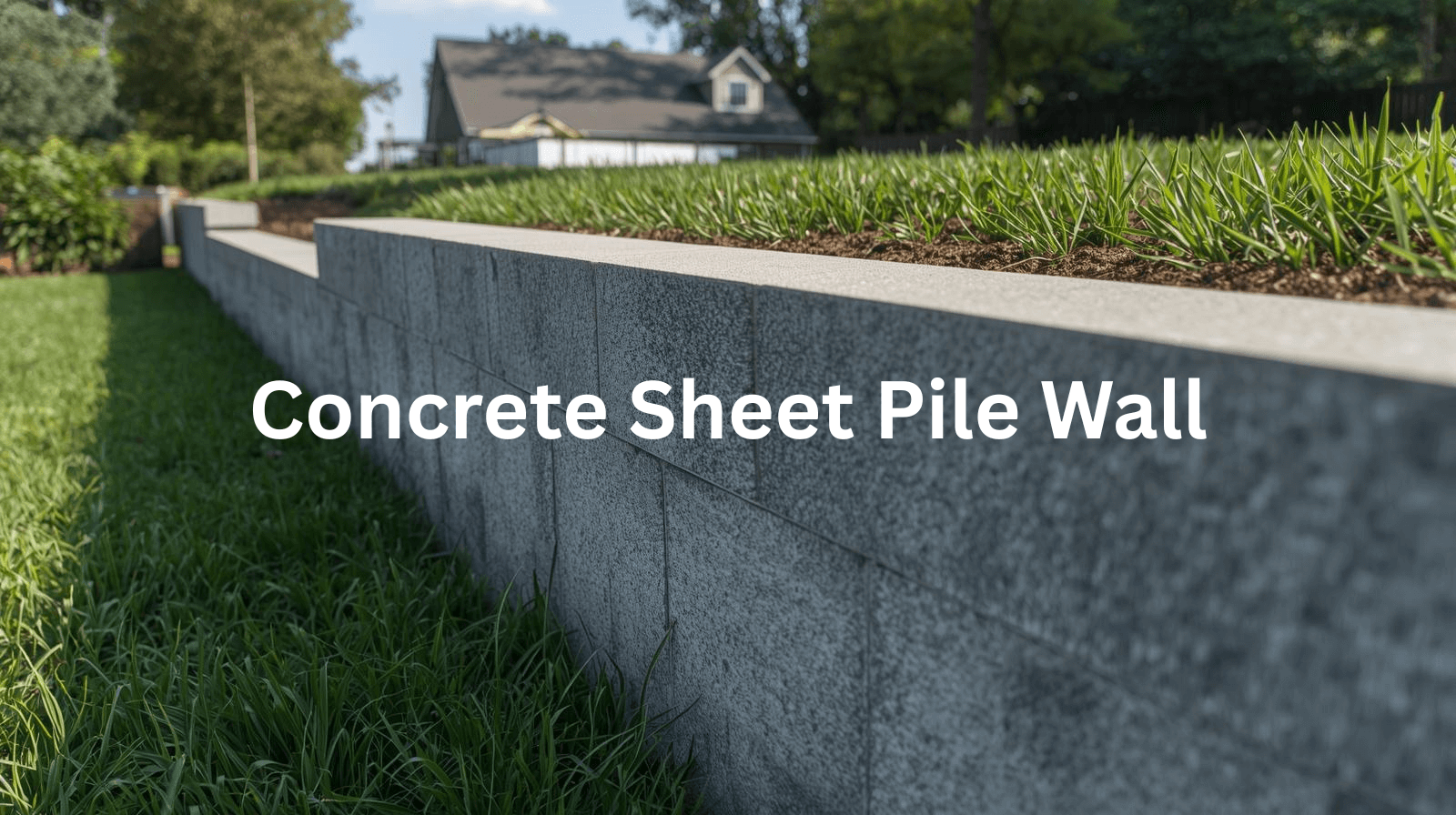
Concrete Sheet Pile Wall
A concrete sheet pile wall with concrete facing is defined as a structural retaining wall system where reinforced concrete piles are driven vertically into the ground and then finished with a concrete facing to enhance durability, load resistance, and aesthetics. The wall provides soil retention, groundwater control, and structural stability, making it essential for foundation support in residential, commercial, and industrial construction projects. The concrete facing acts as a protective barrier that improves weather resistance and long-term performance in environments exposed to pressure, water, or chemical elements.
True Base Concrete Company handles concrete sheet pile wall projects by applying advanced engineering methods, high-quality reinforced concrete materials, and precision-driven installation techniques. The company manages residential projects by ensuring safe landscaping support, commercial projects by strengthening foundations for heavy structures, and industrial projects by providing robust solutions for high-load environments. Project execution includes site preparation, pile driving, reinforcement placement, and concrete facing application to deliver structural integrity. Clients benefit from reliable retaining wall solutions that meet safety standards, zoning codes, and long-lasting performance expectations.
What are the Benefits of Concrete Retaining Walls in Bakersfield, CA?
Providing Long-Lasting Strength and Stability
Providing long-lasting strength and stability means concrete structures are designed to resist heavy loads, prevent cracks, and maintain durability over time. Strength ensures the concrete can handle compression and tension forces, while stability guarantees the structure remains secure against environmental stress, ground movement, and daily usage. A strong base in concrete directly connects to safety, longevity, and reduced maintenance costs, making it essential for reliable construction. Stability of foundations becomes the key factor that supports both the structural integrity and overall performance of buildings. True Base Concrete Company provides this benefit for residential, commercial, and industrial projects by using high-grade materials, advanced concrete mix designs, and precise curing methods. Residential foundations gain durability against soil shifts, while commercial slabs withstand constant foot traffic and heavy equipment. Industrial flooring gains resilience to machinery vibration and chemical exposure, which secures both safety and long-term use. Each project gains long-lasting strength and stability because the company aligns structural requirements with environmental conditions and client needs.
Resisting Heat, Moisture, and Pests
Resisting heat, moisture, and pests means that a construction material can withstand high temperatures, repel water infiltration, and prevent damage caused by insects or rodents. Concrete provides these protective qualities because its dense composition resists thermal expansion, its low permeability blocks moisture intrusion, and its solid surface eliminates nesting areas for pests. Residential structures gain comfort and longevity from these qualities, while commercial buildings benefit through reduced maintenance costs and improved durability. Industrial facilities depend on this resistance to maintain structural integrity under extreme operating conditions. True Base Concrete Company delivers these benefits through advanced concrete mixes and high-performance sealing techniques that enhance strength and resilience. Their concrete resists cracks from heat stress, protects against mold and mildew growth from water, and creates barriers against termites and other pests. Residential projects achieve safe, low-maintenance living spaces, commercial projects maintain reliable infrastructure, and industrial projects gain long-term performance in demanding environments. Each sector receives sustainable value because the concrete consistently resists environmental and biological threats.
Delivering Superior Erosion Control
Delivering superior erosion control means providing effective soil stabilization, surface protection, and water flow management that prevent land degradation across varied environments. Erosion control solutions reduce sediment displacement, safeguard structural foundations, and maintain environmental sustainability in residential, commercial, and industrial projects. Effective erosion control requires durable materials, engineered systems, and precise application techniques that withstand weathering and heavy usage. Superior outcomes come from combining advanced concrete technologies with long-lasting construction methods designed for soil retention and slope stability. True Base Concrete Company delivers this benefit by using reinforced concrete, permeable paving, and retaining wall systems that are engineered to manage runoff and secure landscapes. Residential areas gain value through driveways, patios, and walkways that remain resilient against soil washouts and seasonal rainfall. Commercial projects benefit from parking lots, drainage channels, and foundation supports that reduce long-term maintenance costs and preserve structural safety. Industrial areas achieve consistent performance as heavy-duty concrete solutions resist erosion from large-scale operations, ensuring both durability and environmental compliance.
Enhancing Earthquake Resistance
Enhancing earthquake resistance means strengthening building structures so that foundations, walls, and load-bearing components can withstand seismic activity without major failure. Earthquake resistance protects residential homes, commercial complexes, and industrial facilities from ground vibrations through methods such as reinforced concrete, seismic load distribution, and structural durability. Engineers design earthquake-resistant construction so that energy is absorbed and safely dispersed, reducing cracks, collapses, and costly damages. Building safety ensures occupants remain protected while property maintains long-term value. True Base Concrete Company provides earthquake resistance by using high-grade concrete mixes, advanced reinforcement techniques, and tested construction methods for diverse projects. Residential areas gain durable foundations that resist shaking, while commercial buildings benefit from structural reliability that ensures business continuity. Industrial facilities are supported with heavy-duty concrete solutions designed for large-scale operations where seismic loads are higher. Project execution with earthquake-resistant materials allows True Base Concrete Company to deliver safety, stability, and sustainability across all construction sectors.
Offering Design Versatility
Offering Design Versatility means a construction provider delivers adaptable solutions that match unique aesthetic, functional, and structural needs across residential, commercial, and industrial projects. True Base Concrete Company provides this benefit by using advanced concrete finishes, customizable textures, and diverse color applications that enhance both durability and visual appeal. Residential homeowners experience versatility through stamped concrete patios and decorative driveways that complement personal style. Commercial property managers receive functional yet attractive flooring systems that support heavy foot traffic while aligning with brand identity. Industrial clients gain design flexibility through high-performance concrete slabs, reinforced foundations, and specialized structural elements that meet strict safety and load-bearing requirements. The company aligns engineering precision with architectural creativity, ensuring that each project reflects both strength and design intent. True Base Concrete Company connects structural reliability with design freedom, allowing customers to achieve distinctive outcomes without compromising durability. The result is a consistent balance of performance, efficiency, and visual excellence across every project type.
Maximizing Low Maintenance and Cost Efficiency
Maximizing low maintenance and cost efficiency means designing construction solutions where materials, processes, and structures require minimal upkeep while reducing long-term expenses for property owners. Concrete surfaces, when engineered correctly, deliver durability, energy efficiency, and resistance to wear, which supports lower operational costs over time. Residential projects benefit from easy-to-clean driveways and patios, commercial developments gain from resilient flooring and parking lots, and industrial facilities achieve value through heavy-duty slabs that withstand constant stress. Cost efficiency becomes a direct outcome because less frequent repairs, reduced downtime, and optimized material performance ensure financial savings. True Base Concrete Company provides this benefit by using high-quality concrete mixes, advanced placement techniques, and proper curing methods to extend the life of structures. Residential homeowners receive strong foundations and driveways that resist cracking, while commercial clients enjoy reinforced concrete solutions designed for high-traffic environments. Industrial projects gain added efficiency because heavy-load bearing concrete floors and infrastructure are engineered to meet safety and longevity standards. The company’s expertise in delivering low-maintenance, cost-effective concrete ensures that every project maintains structural integrity, functional reliability, and long-term value across all sectors.
What are the Potential Drawbacks of Retaining Walls (and How We Solve Them) in Bakersfield, CA?
Experiencing Cracking from Soil Pressure and Movement
Experiencing cracking from soil pressure and movement can be defined as the structural distress that occurs when expanding clay soils, ground settlement, or lateral earth pressure exert continuous force against a concrete foundation or slab. Soil movement generates stress that concrete cannot withstand, causing visible fractures, foundation displacement, or slab separation in residential, commercial, and industrial projects. Cracking from soil pressure often indicates compromised load-bearing capacity, reduced structural stability, and potential water intrusion. Homeowners, property managers, and industrial facility owners face safety risks and long-term repair costs when foundational cracks remain untreated. True Base Concrete Company solves this issue through engineered foundation repair, soil stabilization, and reinforced concrete design specifically adapted to diverse project environments. Foundation experts use structural underpinning, steel reinforcement, and moisture-control systems to counteract expansive soil forces and stabilize cracked bases. Engineers apply geotechnical assessment and load distribution techniques so that concrete foundations resist continuous lateral soil pressure and prevent recurring fractures. Residential homes, commercial buildings, and industrial facilities benefit from long-term durability, safety assurance, and structural integrity through True Base Concrete’s specialized concrete repair and foundation stabilization services.
Facing Drainage Issues and Water Buildup
Facing drainage issues and water buildup means that excess rainwater, groundwater, or runoff fails to flow away properly, leading to pooling, flooding, or foundation stress around structures. Drainage problems cause soil erosion, structural cracks, and mold growth that affect residential homes, commercial facilities, and industrial sites alike. Water accumulation around concrete foundations weakens the subgrade support and compromises long-term durability. Improper slope, clogged drainage channels, or inadequate waterproofing often lead to these recurring problems. True Base Concrete Company solves drainage issues and water buildup through advanced concrete foundation systems, site grading, and custom drainage solutions. The company applies techniques such as French drains, sump pump installations, and reinforced concrete slabs to redirect water flow efficiently. Residential projects benefit from secure basements and driveways, commercial properties gain stable parking lots and walkways, and industrial facilities maintain heavy-duty flooring and loading areas free from water damage. True Base Concrete Company ensures every project achieves long-lasting structural integrity, improved safety, and optimal water management.
Undergoing Damage from Earthquake Activity
Undergoing damage from earthquake activity implies that structural elements in residential, commercial, and industrial buildings suffer stress, cracks, or failure due to seismic ground motion. Earthquake vibration causes displacement in concrete foundations, weakening load-bearing walls and creating risks of collapse. Structural integrity becomes compromised when shock waves transfer force unevenly across slabs, beams, and reinforcement. Seismic damage definition connects directly with safety concerns where both occupants and property remain highly vulnerable. True Base Concrete Company solves this issue by using high-strength concrete, reinforced steel frameworks, and seismic-resistant foundation designs that reduce cracking under stress. Advanced concrete curing methods allow foundations to withstand ground shaking, ensuring stability in homes, offices, and factories. Specialized reinforcement technology distributes seismic load evenly, preventing localized failure. Earthquake-resistant construction provided by True Base Concrete gives residential, commercial, and industrial projects long-term durability, safety, and compliance with seismic building codes.
Requiring Higher Upfront Investment
Requiring higher upfront investment implies that a project demands substantial initial capital outlay before generating long-term cost savings or operational benefits. Construction projects in residential, commercial, and industrial areas often face this challenge because materials, labor, and infrastructure must be secured in advance. Higher upfront investment becomes a concern when stakeholders worry about return on investment, cash flow management, and financial risk. Concrete companies addressing this issue must balance cost efficiency with durability to reassure property developers, contractors, and homeowners. True Base Concrete Company solves the issue of high upfront costs by offering optimized concrete mix designs, bulk material procurement, and efficient delivery systems that reduce waste. Residential construction benefits from their tailored concrete solutions that cut maintenance costs while ensuring long-term structural strength. Commercial projects gain value from accelerated project timelines supported by reliable batching plants and advanced curing methods. Industrial areas secure greater return on investment as True Base Concrete Company delivers reinforced concrete solutions that minimize downtime and extend the lifespan of large-scale facilities.
Encountering Soil Erosion Around the Base
Encountering soil erosion around the base means the ground surface near a building’s foundation gradually loses soil due to water runoff, poor drainage, or weather exposure. Soil becomes displaced from the base, which weakens foundation stability and creates cracks or gaps that allow moisture penetration. Foundation walls absorb excess water, and the structural base suffers from reduced load-bearing capacity. Residential properties experience yard flooding, commercial buildings face parking lot settlement, and industrial areas risk equipment instability. True Base Concrete Company solves soil erosion problems by reinforcing the foundation base with concrete stabilization, proper drainage installation, and erosion control measures. Engineers assess water flow patterns, then apply solutions like French drains, retaining walls, and reinforced concrete footings. Concrete base strengthening restores stability for homes, secures durability for office complexes, and ensures operational safety for large-scale industrial facilities. Long-term foundation support reduces soil displacement, prevents structural damage, and safeguards property value.
Limiting Future Layout Changes
Limiting Future Layout Changes can be defined as the proactive design and construction strategy where structural elements, concrete foundations, and site layouts are planned in advance to minimize costly modifications, disruptions, or redesigns in the future. Construction companies apply this principle to ensure stability, durability, and adaptability of spaces so that residential driveways, commercial parking lots, and industrial floors remain functional without requiring major reconstruction. The concept emphasizes planning reinforcement placement, load distribution, and surface finishing in a way that prevents future layout conflicts or infrastructure incompatibilities. True Base Concrete Company solves this issue by implementing precision site preparation, advanced concrete pouring techniques, and reinforcement strategies that align with long-term project requirements. The company uses high-grade concrete mix, control joints, and foundation leveling methods that support heavy loads in industrial warehouses, seamless traffic flow in commercial complexes, and long-lasting durability for residential projects. Their approach connects engineering precision with project sustainability, allowing property owners to reduce maintenance costs and avoid unnecessary layout revisions. Clients in residential, commercial, and industrial sectors benefit from reliable concrete solutions that provide structural consistency and prevent future layout change challenges.
Why Choose Us for Your Concrete Services in Bakersfield, CA
- Experience You Can Count On: Our years of expertise ensure reliable, consistent results.
- Quality Workmanship: We take pride in every project, delivering craftsmanship that stands the test of time.
- On-Time & On-Budget: We adhere to deadlines and stay within budget, ensuring a hassle-free experience.
- Full-Service Capabilities: From design to installation, we offer comprehensive, quality services for all your concrete needs.
- True Base Concrete Company is licensed by Contractors State License Board (CSLB) and the City of Bakersfield's Development Services Department
- Free Estimates & Expert Advice: Our clear, free estimates and honest guidance help you make informed decisions.
- Proven Customer Satisfaction: Our track record of happy clients demonstrates our commitment to exceeding expectations.

True Base Concrete Company Location in Bakersfield, CA
Bakersfield Office Details
- Mon-Sat 9AM to 6PM
- +1 (661) 371-7412
- muaz.sheikh2k2@gmail.com
- Link to Google Business Profile
- 1712 19th St, Bakersfield, CA 93301, United States
Areas True Base Concrete Company Serve
Frequently Asked Questions (FAQs)
Is a Concrete Retaining Wall Cheaper Than Blocks in Bakersfield, CA?
A poured concrete retaining wall is often more cost-effective in Bakersfield for larger projects compared to block walls because it requires fewer materials and less labor for installation. Block retaining walls, however, may be cheaper for small residential projects due to easier handling and design flexibility. True Base Concrete Company evaluates soil conditions, load requirements, and project scale to recommend the most cost-efficient option without compromising durability.
What Are the Disadvantages of Concrete Retaining Walls?
Concrete retaining walls can be more difficult to modify once poured and may require professional expertise for drainage integration. Improper installation can lead to cracking, water seepage, or soil pressure damage. True Base Concrete Company addresses these disadvantages by using reinforced concrete, precision drainage systems, and expansion joints to extend wall life and reduce maintenance needs.
How Thick Does a Concrete Retaining Wall Need to Be?
The thickness of a concrete retaining wall depends on its height, load requirements, and soil conditions. In Bakersfield, residential retaining walls generally start at 6 to 8 inches thick, while taller commercial or industrial walls may require 10 to 12 inches or more with reinforcement. True Base Concrete Company calculates proper wall thickness based on engineering standards to ensure safety and long-term stability.
What Is the 1:3 Rule for Retaining Walls in Bakersfield, CA?
The 1:3 rule states that a retaining wall should have at least one-third of its height below ground level for proper stability. This proportion helps resist soil pressure and prevents tipping or sliding in Bakersfield’s varying soil types. True Base Concrete Company applies this rule with precise excavation and footing design to build retaining walls that meet local safety standards.
What is the Difference Between Concrete Retaining Wall and Concrete Slabs?
A concrete retaining wall is a vertical structure built to hold back soil and manage slopes, while a concrete slab is a flat horizontal surface used for floors, patios, or foundations. The wall resists lateral soil pressure, whereas the slab distributes vertical loads. True Base Concrete Company designs both with reinforced concrete but adapts thickness, reinforcement, and drainage features to their distinct functions.
What is the Difference Between Concrete Retaining Wall and Concrete Driveways?
A concrete retaining wall stabilizes soil and prevents erosion, while a concrete driveway provides a flat surface for vehicles and pedestrian access. The wall requires structural reinforcement against horizontal soil forces, whereas the driveway is engineered for weight distribution and durability under vehicle loads. True Base Concrete Company constructs both with durable concrete mixes tailored to their specific stress conditions.
What is the Difference Between Concrete Retaining Wall and Concrete Walkways?
A concrete retaining wall serves as a barrier to support and contain soil, while a concrete walkway provides a smooth, safe path for walking. The wall is engineered to resist soil pressure, while the walkway is designed for surface durability and ease of movement. True Base Concrete Company ensures each is built with proper finishing, reinforcement, and drainage suited to its purpose.
What is the Difference Between Concrete Retaining Wall and Concrete Patio?
A concrete retaining wall functions as a structural element to hold soil in place, while a concrete patio is a horizontal outdoor living surface for leisure and gatherings. The wall focuses on strength and soil stability, while the patio emphasizes comfort, design, and usability. True Base Concrete Company constructs both with premium concrete but customizes reinforcement, thickness, and finishing techniques for their unique roles.
